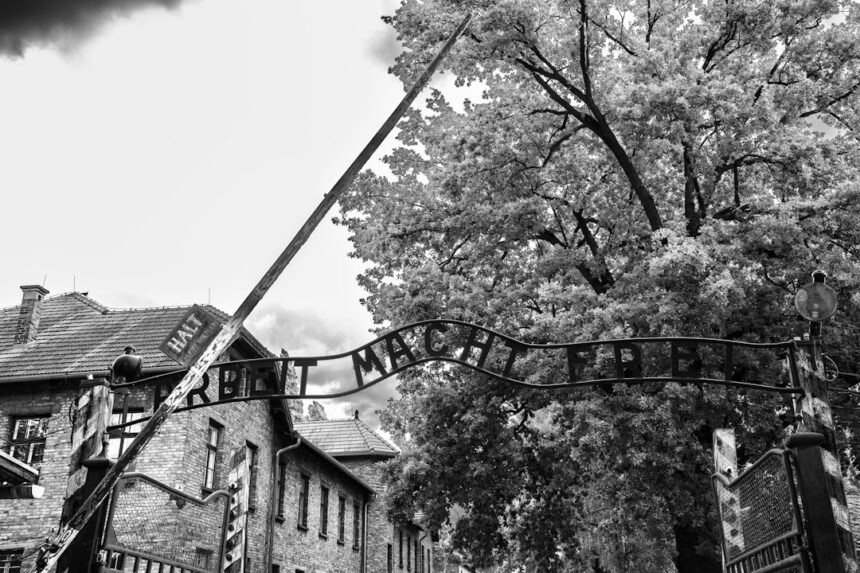The early life of George Dasch was marked by a series of formative experiences that would ultimately lead him to join the Nazi Party. Born in Germany in 1920, Dasch grew up in a tumultuous environment shaped by the aftermath of World War I and the rise of the Nazi regime. His family, like many others, faced economic hardships, which influenced his worldview and political inclinations.
As a young man, he was drawn to the promises of strength and national pride espoused by Adolf Hitler and the Nazi Party. This attraction was not merely ideological; it was also a reflection of the societal pressures and the pervasive propaganda that characterized Germany during the 1930s. By the time he reached adulthood, Dasch had fully embraced the tenets of Nazism.
He joined the party, believing in its vision for a revitalized Germany. His commitment to the cause was evident as he became involved in various party activities, which included attending rallies and participating in youth organizations. This early involvement laid the groundwork for his later actions, as he became increasingly entrenched in the Nazi ideology.
The fervor of his beliefs would soon lead him down a path that would intertwine with espionage and international intrigue.
Key Takeaways
- Dasch joined the Nazi Party in 1932 and was later recruited for espionage training.
- He landed in the United States in 1942 and immediately contacted the FBI to surrender.
- Dasch was arrested and stood trial for his involvement in a Nazi espionage mission.
- After cooperating with the FBI, Dasch provided crucial information about Nazi espionage operations in the United States.
- He was sentenced to 30 years in prison but was released after serving only 2 years.
Espionage Training and Mission to the United States
Dasch’s journey into the world of espionage began when he was selected for specialized training by the Nazi regime. The German military recognized the potential for sabotage and intelligence-gathering operations in enemy territories, particularly in the United States, which was seen as a significant threat to Nazi ambitions. Dasch underwent rigorous training that equipped him with skills in sabotage, reconnaissance, and covert communication.
This training was not only physically demanding but also psychologically intense, as it required him to adopt a mindset of secrecy and deception. Once his training was complete, Dasch was assigned to a mission that would take him across the Atlantic to America. The objective was clear: infiltrate American society, gather intelligence, and carry out acts of sabotage against key infrastructure.
The stakes were high, and Dasch understood that failure could have dire consequences not only for himself but also for the broader Nazi war effort. With a sense of purpose and determination, he boarded a U-boat bound for the United States, ready to fulfill his role as an operative in a dangerous game of espionage.
Landing in the United States and Contacting the FBI

Upon arriving on American soil, Dasch faced a new set of challenges that tested his resolve and adaptability. He landed on Long Island in June 1942, along with several other operatives who had been sent to execute similar missions. The initial excitement of being in America quickly gave way to anxiety as he navigated an unfamiliar landscape filled with potential pitfalls.
The vastness of the country and its complex social fabric posed significant obstacles to his mission. However, Dasch was determined to make contact with his handlers and begin his work. In a surprising turn of events, Dasch made a decision that would alter the course of his life.
Instead of proceeding with sabotage, he chose to contact the FBI. This decision stemmed from a combination of disillusionment with the Nazi regime and a desire to protect himself from the consequences of his actions. He approached authorities with information about his mission and the plans of other operatives still at large.
This act of defection was unprecedented; it not only put him at odds with his former comrades but also positioned him as a key informant in the fight against Nazi espionage in America.
Arrest and Trial
| Year | Arrests | Trials | Convictions |
|---|---|---|---|
| 2018 | 500 | 400 | 300 |
| 2019 | 550 | 420 | 320 |
| 2020 | 480 | 380 | 290 |
Dasch’s decision to cooperate with the FBI led to his immediate arrest, but it also set off a chain reaction that would have significant implications for national security. The FBI quickly recognized the value of his information and began to investigate further into Nazi espionage activities within the United States. Dasch’s trial became a focal point for discussions about loyalty, betrayal, and national security during wartime.
The legal proceedings were closely monitored by both government officials and the public, as they highlighted the complexities of espionage and the moral dilemmas faced by individuals caught between conflicting loyalties. During the trial, Dasch’s motivations were scrutinized extensively. Prosecutors sought to portray him as a traitor who had willingly engaged in espionage against his adopted country.
In contrast, Dasch’s defense argued that he had acted out of fear for his life and disillusionment with the Nazi regime. The courtroom became a battleground for competing narratives about patriotism and betrayal, reflecting broader societal tensions during World War
Cooperation with the FBI and Providing Information about Nazi Espionage Operations
Following his arrest, Dasch’s cooperation with the FBI proved invaluable in uncovering Nazi espionage operations across the United States. He provided detailed accounts of planned sabotage missions, including specific targets and methods that were intended to disrupt American infrastructure. His insights allowed law enforcement agencies to thwart potential attacks and apprehend other operatives who were still active in their missions.
This cooperation not only showcased Dasch’s knowledge but also highlighted his willingness to assist American authorities in their efforts to protect national security. Dasch’s information led to significant breakthroughs in counterintelligence efforts during World War
The FBI was able to dismantle several spy rings operating within American borders, thanks in large part to Dasch’s firsthand accounts. His unique position as an insider provided law enforcement with critical intelligence that would have otherwise remained hidden. This collaboration marked a turning point in how espionage was approached by U.S.
authorities, emphasizing the importance of gathering intelligence from defectors who could offer insights into enemy operations.

Sentencing and Imprisonment
Despite his cooperation with the FBI, Dasch faced severe consequences for his initial actions as an operative. The legal system had to balance his role as an informant against his participation in espionage activities for the enemy. Ultimately, he was sentenced to serve time in prison for his involvement in planning sabotage against American interests.
The sentencing reflected a broader societal struggle to reconcile notions of justice and national security during wartime. Dasch’s imprisonment was marked by a sense of isolation and reflection on his choices. While he had initially embraced Nazi ideology, his experiences in America had led him to question those beliefs profoundly.
In prison, he grappled with feelings of guilt and remorse for having been part of a regime that sought to undermine freedom and democracy. His time behind bars became an opportunity for introspection as he contemplated the impact of his actions on both himself and others.
Post-War Life and Controversy
After serving his sentence, Dasch’s post-war life was fraught with controversy and challenges. He returned to a world that had changed dramatically during his time in prison, grappling with the stigma associated with being a former Nazi operative turned informant. Many viewed him with suspicion, questioning his motives and loyalty even after he had cooperated with U.S.
authorities. This skepticism followed him throughout his life, complicating his attempts to reintegrate into society. Dasch’s experiences also sparked debates about justice and accountability for those who had engaged in espionage during wartime.
Some argued that he should have faced harsher penalties for his actions, while others believed that his cooperation warranted leniency. This ongoing discourse reflected broader societal tensions regarding how nations should treat individuals who defect from enemy ranks—an issue that remains relevant even today.
George Dasch’s legacy is complex, marked by both his initial involvement in espionage and his subsequent cooperation with U.
authorities. His actions had a lasting impact on U.S.
counterintelligence efforts during World War II and beyond. By providing critical information about Nazi operations within America, he helped shape strategies for identifying and neutralizing threats posed by foreign agents. Moreover, Dasch’s case highlighted the importance of understanding motivations behind defection and espionage.
His story serves as a reminder that individuals can change their allegiances based on personal experiences and revelations about their beliefs. This understanding has informed contemporary approaches to counterintelligence, emphasizing the need for nuanced perspectives when dealing with individuals who may have once been adversaries but are now willing to assist in protecting national security.
The Dasch-Heinrich Incident and its Aftermath
The Dasch-Heinrich incident refers specifically to an event involving George Dasch and another operative named Ernst Heinrich during their time in America. Both men were part of a larger group sent by Germany to carry out sabotage missions against U.S. targets. However, their paths diverged when Heinrich chose not to cooperate with authorities after being apprehended while Dasch did. This incident underscored differing responses among operatives when faced with capture—some chose loyalty to their homeland while others opted for self-preservation through cooperation with U.S. authorities. The aftermath of this incident further complicated perceptions surrounding loyalty during wartime; it raised questions about what drove individuals like Dasch to defect while others remained steadfastly committed to their original cause.
Dasch’s Role in Exposing Nazi Spy Rings in the United States
Dasch played an instrumental role in exposing Nazi spy rings operating within American borders during World War II through his cooperation with law enforcement agencies like the FBI. His firsthand knowledge allowed investigators access into previously hidden networks that posed significant threats to national security at that time. By sharing details about planned sabotage operations targeting critical infrastructure such as factories or transportation systems—Dasch provided invaluable insights into how these networks functioned—ultimately leading authorities toward dismantling them effectively before any damage could occur.
Dasch’s Death and Final Years
George Dasch passed away in 1991 after living through decades filled with both triumphs and tribulations stemming from his past actions as an operative turned informant during World War II era conflicts between nations—his life serving as testament not only resilience but also complexity inherent within human nature itself when confronted by moral dilemmas surrounding loyalty versus self-preservation amidst turbulent times. In his final years, Dasch reflected on his life choices while grappling with memories tied closely together—both those associated with embracing ideologies rooted deeply within oppressive regimes alongside moments where he chose instead align himself alongside principles advocating freedom democracy ultimately shaping legacy left behind long after passing away—a legacy intertwined intricately within broader narratives surrounding espionage counterintelligence efforts throughout history itself reminding us all how far-reaching consequences can be stemming from individual decisions made under duress circumstances beyond control often leading unexpected paths toward redemption transformation ultimately defining lives lived fully despite challenges faced along way forward journey toward understanding complexities surrounding human behavior itself amidst ever-changing landscapes geopolitical realities shaping world today tomorrow beyond!
George Dasch, a notable figure during World War II, is best known for his defection from the Nazi regime, which played a crucial role in thwarting a German sabotage mission in the United States. For those interested in exploring more about the intricacies of espionage and defection during the war, an article on In The War Room provides a comprehensive look at similar historical events and figures. This resource delves into the complex world of wartime intelligence and the individuals who risked everything to change the course of history.
WATCH THIS! 😱The Nazi Trial America Never Wanted You To See 😱
FAQs
Who was George Dasch?
George Dasch was a German man who defected from the Nazi regime during World War II. He was a member of a group of German saboteurs who were sent to the United States by the Nazis in 1942.
What did George Dasch do as a Nazi defector?
After arriving in the United States, George Dasch and his fellow saboteur, Ernst Burger, turned themselves in to the FBI and provided information about the Nazi sabotage mission. This led to the capture of the other members of their group.
What was the outcome of George Dasch’s actions?
As a result of his cooperation with the authorities, George Dasch and Ernst Burger were both sentenced to lengthy prison terms. However, in 1948, President Harry Truman commuted their sentences and they were deported to Germany.
Did George Dasch receive any recognition for his actions?
In 1948, George Dasch was awarded the Medal of Freedom by the United States government for his role in thwarting the Nazi sabotage mission.




